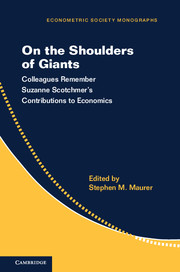Book contents
- On the Shoulders of Giants
- Econometric Society Monographs
- On the Shoulders of Giants
- Copyright page
- Dedication
- Contents
- Contributors
- Preface
- Acknowledgments
- Chapter 1 Introduction
- Part I Threads in the Tapestry
- Part II Innovation Theory (I): Cumulative Innovation
- Part III Innovation Theory (II): Law and Economics
- Part IV Club Theory
- Part V Evolutionary Game Theory
- Part VI Public Policy
- Part VII Living Legacy
- Part VIII Epilog
- Bibliography
- Index
- References
Part V - Evolutionary Game Theory
Published online by Cambridge University Press: 12 October 2017
- On the Shoulders of Giants
- Econometric Society Monographs
- On the Shoulders of Giants
- Copyright page
- Dedication
- Contents
- Contributors
- Preface
- Acknowledgments
- Chapter 1 Introduction
- Part I Threads in the Tapestry
- Part II Innovation Theory (I): Cumulative Innovation
- Part III Innovation Theory (II): Law and Economics
- Part IV Club Theory
- Part V Evolutionary Game Theory
- Part VI Public Policy
- Part VII Living Legacy
- Part VIII Epilog
- Bibliography
- Index
- References
Summary
Received March 9, 1997; revised March 14, 1999
A long-standing conjecture is that winner-take-all games such as patent races lead to the survival of risk-takers and the extinction of risk-averters. In many species a winner-take-all game determines the males’ right to reproduce, and the same argument suggests that males will evolve to be risk-takers. Psychological and sociological evidence buttresses the argument that males are more risk-taking than females. Using an evolutionary model of preference-formation, we investigate to what extent evolution leads to risk-taking in winner-take-all environments.
Journal of Economic Literature Classification Numbers: C7, D8.
- Type
- Chapter
- Information
- On the Shoulders of GiantsColleagues Remember Suzanne Scotchmer's Contributions to Economics, pp. 264 - 306Publisher: Cambridge University PressPrint publication year: 2017

